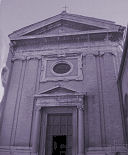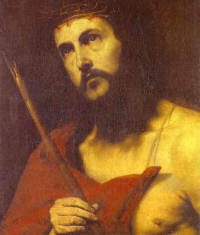» Enjoy our Liturgical Seasons series of e-books!
"False witnesses have stood up against me, and my enemies threaten violence; Lord, do not surrender me into their power!" Our Lord calls upon His heavenly Father to shield Him against His enemies. In God's providence, however, the Cross of Christ was destined to be a sign of glory and not an emblem of shame: from that Cross came victory over Satan, from it came life, resurrection and salvation: "It behooves us to glory in the Cross of our Lord Jesus Christ in whom is our salvation, life and resurrection, by whom we are saved and delivered".
On the Cross Our Lord expiated our avarice by His extreme poverty, our sensuality by His most bitter sufferings, our pride by His profound humiliations, our disobedience by His most perfect submission to the Will of God. Embracing us with His extended arms He draws us into the path which He has trod and which alone leads to life eternal. — Cathedral Daily Missal
Outside of Holy Week, the Church clelebrates the Optional Memorial of St. John the Baptist de la Salle. St. John Baptist de La Salle was born in Rheims, France. He was known as the Father of Modern Pedagogy. He opened free schools for poor children, introducing new teaching methods. He organized the congregation called the Brothers of the Christian Schools, which made great contributions to popular education.
Meditation for Tuesday of Holy Week
The Gospel readings at Mass today and tomorrow center on Judas's betrayal, which sets in motion the last act of the drama of Jesus's life. Matthew's account, to be read tomorrow, is perhaps the more familiar of the two: Judas approaches the chief priests and is paid thirty pieces of silver to deliver Jesus into the hands of his enemies. John's account in today's Mass is the more theologically suggestive. Jesus, in sovereign command of the situation, knows what Judas is about. He knows that Satan has tempted this disciple, and that Judas is in mortal danger of being conscripted into the legion of those who violently oppose the Father's design of salvation history, which is being worked out in Jesus's person and mission. In a last act of fellowship and love, Jesus reaches out to Judas and offers him the dipped morsel—at which point, the gospel narrator reports, "Satan entered into him." Yet even here, at the moment of moral betrayal, Jesus bends what seems to be Satan's victory to his own and the Father's purposes, sending Judas off and telling him to "do quickly" what he plans to do.
The contrast between Judas's betrayal and Peter's impending three denials at the interrogation of Jesus is striking. Although Peter denies knowing the Master, his tears of remorse and repentance bring him forgiveness. As with the prodigal son, his filial dignity is restored, and the continued outpouring of the Divine Mercy turns him into the rock, the foundation, on which the Church of the Risen One is built. Judas, as the Church will read on Good Friday, compounds his sin of betrayal by committing the sin of despair. Unable to imagine forgiveness for such a sin as his, he falls into what Pope Benedict XVI once described as his "second tragedy," killing himself. Brought by grace from the darkness of betrayal to the light of repentance, Peter lives, eventually giving his life out of love for his Lord. Rejecting the Light of the world, Judas enters the darkness of those who hate the divine master plan and its bearer, and is ensnared in their death-dealing plots.
The reading from Isaiah in today's Mass, taken from the second of the Suffering Servant songs, speaks of the glorification of the one whom "the LORD called from the womb," whose "mouth [was] like a sharp sword": "It is too light a thing that you should be my servant," says the LORD. Rather, "I will give you as a light to the nations, that my salvation may reach to the end of the earth."
This vindication of the Suffering Servant, whose luminous witness will draw all nations to a knowledge of the one true God who is the God of Israel, anticipates and prefigures what the Church calls the "communion of saints," as does that "great cloud of witnesses" of which the author of the Letter to the Hebrew speaks in today's Office of Readings. Prior to the invocation of this image, the eleventh chapter of Hebrews catalogues the acts of faith by which the "men of old received divine approval" and thus became witnesses to the saving action in history of Israel's God, which would reach its climax in Jesus. Their company includes Abel, the righteous bearer of sacrificial gifts; Enoch, who did not taste death; Noah, who saved humanity from the flood; Abraham, who "sojourned in the land of promise" and obediently offered his firstborn, Isaac (whose rescue prefigures the Resurrection); Moses, who "considered abuse suffered for the Christ greater wealth than the treasures of Egypt, for he looked forward to the reward." There are judges, kings, prophets, and martyrs here—all these valiant men and women of the covenant with Israel inspire Lenten pilgrims to receive with gratitude the gift that will be given in the sacrifice of the Son and his resurrection from the dead: "Since we are surrounded by so great a cloud of witnesses, let us lay aside every weight, and sin which clings so closely, and let us run with perseverance the race that is set before us, looking to Jesus the pioneer and perfecter of our faith, who for the joy that was set before him endured the cross, despising the shame, and is seated at the right hand of the throne of God" [Hebrews 12.1-2; see also Hebrews 11.4-38].
The "communion of saints," in which the Church professes its belief every time she prays the Nicene Creed and the Apostles Creed, extends the baptismal gift of supernatural charity both through time and beyond the boundaries of time. As Pope Paul VI's 1967 apostolic constitution, The Doctrine of Indulgences, puts it, "a perennial link of charity exists between the faithful who have reached their heavenly home, those who are expiating their sins in Purgatory, and those who are still pilgrims on earth. Between them there is ... an abundant exchange of all good things." This exchange aims at perfecting the entire Church in the caritas Christi: the love of Christ that Judas rejected; the love that enabled Peter to confess his denials and receive forgiveness. In the economy of salvation, men and women of every time and place are, by the power of the Holy Spirit, enabled to confess, with St. Paul, that "the Son of God... loved me and gave himself for me" [Galatians 2.20]. Putting on that selfless, life-giving love through adherence to the Anointed One of God is what it means to imitate Christ. To love God and neighbor freely and without calculation is to be enumerated among the "great cloud of witnesses," to live within the communion of saints. To love freely is to love as Jesus loved during this week of climax in the drama of salvation history.
And to love freely is to be drawn into worship at the Wedding Feast of the Lamb, as one of the greatest of theological poets, Gerard Manley Hopkins, understood, in his poetic translation of a prayer of St. Francis Xavier:
O God, I love thee, I love thee—
Not out of hope of heaven for me
Nor fearing not to love and be
In the everlasting burning.
Thou, thou, my Jesus, after me
Didst reach thine arms out dying,
For my sake sufferedst nails and lance,
Mocked and marred countenance,
Sorrows passing number,
Sweat and care and cumber,
Yea and death, and this for me,
And thou couldst see me sinning:
Then I, why should not I love thee,
Jesu, so much in love with me?
Not for heaven's sake;
not to be Out of hell by loving thee;
Not for any gains I see;
But just the way that thou didst me
I do love and will love thee;
What must I love thee, Lord, for then?
For being my king and God. Amen.
—George Weigel, Roman Pilgrimage: The Station Churches
 Tuesday of Holy Week
Tuesday of Holy WeekStation with Santa Prisca all'Aventino (St. Prisca):
The Station today is at the church of St. Prisca. Saint Prisca was baptized by Saint Peter when she was thirteen. She was thrown to the lions by Claudius (41-54), but the lion only licked her feet. She was then beheaded. Her home was made into a church by Pope Saint Eutychianus (275-283), who placed her remains under the high altar. It was probably one of the first gathering places for Christians in Rome.
For more on Santa Prisca all'Aventino, see:
For further information on the Station Churches, see The Stational Church.
Meditation for Tuesday of Holy Week
Today, again, our Savior sets out in the morning for Jerusalem. His intention is to repair to the temple, and continue His yesterday's teachings. It is evident that His mission on earth is fast drawing to its close. He says to His disciples: "You know that after two days shall be the Pasch, and the Son of Man shall be delivered up to be crucified."
On the road from Bethania to Jerusalem, the disciples are surprised at seeing the fig-tree, which their divine Master had yesterday cursed, now dead. Addressing himself to Jesus, Peter says: "Rabbi, behold, the fig-tree, which Thou didst curse, is withered away." In order to teach us that the whole of material nature is subservient to the will of God, Jesus replies: "Have the faith of God. Amen I say to you, that whosoever shall say to this mountain: Be thou removed and cast into the sea! and shall not stagger in his heart, but believe that whatsoever he saith shall be done, it shall be done unto him."
Having entered the city, Jesus directs His steps towards the temple. No sooner has He entered, than the chief priests, the scribes, and the ancients of the people, accost Him with these words: "By what authority dost Thou do these things and who has given Thee this authority, that Thou shouldst do these things?" We shall find our Lord's answer given in the Gospel. Our object is to mention the leading events of the last days of our Redeemer on earth; the holy volume will supply the details.
As on the two preceding days, Jesus leaves the city towards evening: He passes over Mount Olivet, and returns to Bethania, where He finds His blessed Mother and His devoted friends.
—The Liturgical Year, Abbot Gueranger O.S.B.






